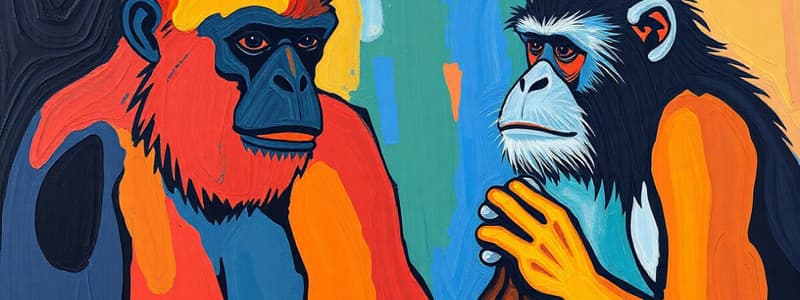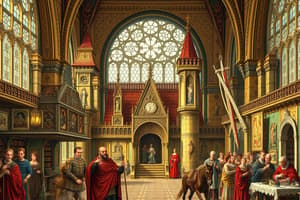Podcast
Questions and Answers
What is the meaning of religion?
What is the meaning of religion?
Religion is what binds things together, such as families, societies, and the world.
What does the term 'animism' refer to?
What does the term 'animism' refer to?
Animism is the belief that all things, animate and inanimate, possess a spirit or essence.
What is the 'personalistic view' of religion?
What is the 'personalistic view' of religion?
The personalistic view of religion is based on the concept of animism, suggesting that religion arises from belief in spirits and souls.
What does the 'non-personalistic view' of religion focus on?
What does the 'non-personalistic view' of religion focus on?
Describe the concept of 'mana'.
Describe the concept of 'mana'.
What is 'totemism'?
What is 'totemism'?
The term 'totem' was correctly understood by the British merchant and translator who introduced it into the English language.
The term 'totem' was correctly understood by the British merchant and translator who introduced it into the English language.
Explain how religion flourishes.
Explain how religion flourishes.
Flashcards
Religion's Etymology
Religion's Etymology
Religion, from Latin, combines 'res' (a thing) and 'ligare' (to bind), meaning it connects things, people, and the world.
Religion & Morality
Religion & Morality
Religion often forms the basis of morality and human relationships, especially where a divine law is believed to govern all.
Religion & Harmony
Religion & Harmony
Religion connects humans to other living things and gods fostering harmony and a sense of belonging.
Evolution of Religion
Evolution of Religion
Signup and view all the flashcards
Neanderthal Rituals
Neanderthal Rituals
Signup and view all the flashcards
Behavioral Modernity
Behavioral Modernity
Signup and view all the flashcards
Symbolic Behavior (Early)
Symbolic Behavior (Early)
Signup and view all the flashcards
Ochre (Pigment)
Ochre (Pigment)
Signup and view all the flashcards
Explanatory Function of Religion
Explanatory Function of Religion
Signup and view all the flashcards
Social Solidarity & Religion
Social Solidarity & Religion
Signup and view all the flashcards
Animism (Tylor)
Animism (Tylor)
Signup and view all the flashcards
Animatism (Marett)
Animatism (Marett)
Signup and view all the flashcards
Mana
Mana
Signup and view all the flashcards
Totemism (Durkheim)
Totemism (Durkheim)
Signup and view all the flashcards
Religion as Social Construct
Religion as Social Construct
Signup and view all the flashcards
Religion's Role in Identity
Religion's Role in Identity
Signup and view all the flashcards
Identity Influence
Identity Influence
Signup and view all the flashcards
World Religions
World Religions
Signup and view all the flashcards
Religion : Beliefs
Religion : Beliefs
Signup and view all the flashcards
Religion : Practices
Religion : Practices
Signup and view all the flashcards
Study Notes
Etymology of Religion
- The origin of the word "religion" (Latin, religio) is debated.
- The most likely derivation is from the combination of "res" (a thing) and "ligare" (to bind).
- Religion, therefore, is what unites things together (families, societies, the world).
Religion's Role in Society
- Religion provides a framework for morality and human relationships.
- It is often considered the foundational principle for how people should interact with each other and the environment.
- In many societies, it's believed to provide a divine law that governs all aspects of life and provides meaning.
Non-Human Primate Religious Traits
- Barbara King argues that although non-human primates aren't religious, they possess attributes necessary for the evolution of religion.
- These include high intelligence, symbolic communication, a developed concept of "self," recognition of social norms, and a sense of continuity.
Evidence of Ritual in Neanderthals
- There's inconclusive evidence that Neanderthals buried their dead, suggesting ritualistic practices.
- Evidence of burial rituals is often taken as an indication of religious activity.
- No other verifiable evidence exists for religious practice among humans before reaching behavioral modernity.
Symbolic Use of Ochre
- Early evidence of symbolic behavior is found in Middle Stone Age sites in Africa, at least 100,000 years ago.
- The use of pigments like red ochre is discovered.
- The use of ochre in hunter-gatherer societies may not have had practical applications. Therefore, evidence of its use is interpreted as either symbolic or ritual.
Ochre: Composition and Uses
- Ochre (ocher) is a naturally occurring clay pigment.
- It's a mixture of ferric oxide and varying amounts of clay and sand.
- It ranges in color from yellow to deep orange or brown, with a light brownish-yellow being a common variant.
Modern Use of Ochre
- Red ochre remains a key part of rituals in extant hunter-gatherer populations worldwide.
- Commonly believed to represent, blood, sex, life and death in various cultures.
Why Religion Flourished
- Explanatory Function: Religion provided meaning and answers in times of uncertainty and crisis. It explains the unknown through stories of creation and salvation, and provides solace in chaotic situations.
- Social Solidarity and Unity: Worship as a public act fosters social bonds and solidarity. It's also been associated with positive psychological benefits.
Origin: Personalistic View (Tylor)
- Edward B. Tylor, an anthropologist, viewed early religion, specifically, in societies lacking writing as personalistic.
- He coined the term "Animism" from the Latin "anima" (spirit).
- Animism describes belief that inanimate objects (as well as animate objects) possess spirits.
Non-Personalistic View (Marett)
- Robert Ranulph Marett, a British anthropologist, offered a different perspective on the origin of religious beliefs.
- He theorized that early religions revolved around the belief in impersonal supernatural forces.
- This 'life force', or 'mana', was believed to be present in all things and could be used or changed with rituals.
Totemism
-
Emile Durkheim studied Totemism, a complex belief system which involves identifying with animals or plants to unify clans or groups.
-
Totemism in several cultures is the recognition of a spirit, an animal or a plant with which kinship or a mystical relationship is held.
-
Totemism is recognized as the simplest of religious expressions.
Religion as Idealized Society (Durkheim)
- Worshipping a symbol of the sacred is synonymous with worshipping society itself.
- Collective social acts (e.g. religious worship), reinforce social bonds and unity.
- All religions serve this basic function, meaning all religions are, in a sense, "true."
What Constitutes Religion
- Belief: The intellectual dimension of religion, including faith and conceptions of reality.
- Practice: The social aspect of religion, encompassing ritual and communal expressions
Religion as Identity
- Religion plays a significant role in building group cohesion, social identity, in challenging the marginalized, and asserting social identity vis-à-vis other groups.
- Parental influence and community involvement are also key factors in developing religious identity.
Conclusion
- Religion is positively correlated with identity formation and religious commitment.
- Religious influences on identity formation also stems from parental influence and community influence.
- The strength of the link between religion and identity can vary depending on the time period and the socio-cultural context. The impact may be stronger in societies with a greater reliance on religious doctrines.
Studying That Suits You
Use AI to generate personalized quizzes and flashcards to suit your learning preferences.




